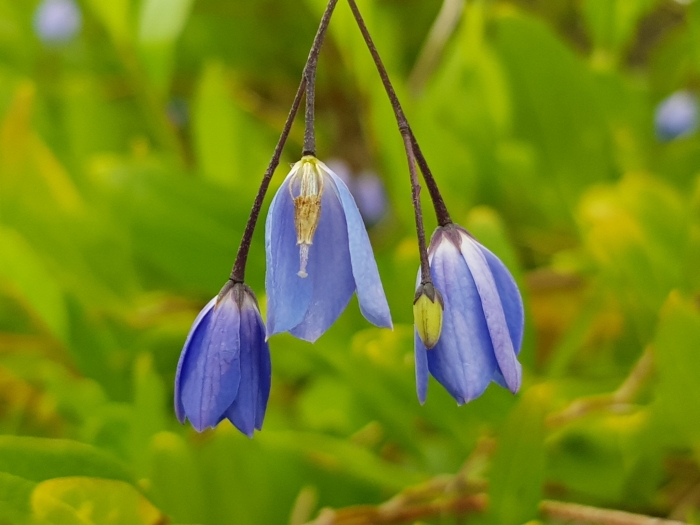Bluebell Creeper
(Billardiera heterophylla)
Bluebell Creeper (Billardiera heterophylla)
/
/

© Lek Khauv
CC BY 4.0
Image By:
© Lek Khauv
Recorded By:
Copyright:
CC BY 4.0
Copyright Notice:
Photo by: © Lek Khauv | License Type: CC BY 4.0 | License URL: http://creativecommons.org/licenses/by/4.0/ | Uploader: lek | Publisher: iNaturalist |



































Estimated Native Range
Summary
Billardiera heterophylla, commonly known as Bluebell Creeper, is an evergreen flowering perennial vine. It is native to the open woodlands and forest margins of Southwestern Australia, where it thrives in the well-drained sandy soils and Mediterranean climate. This plant typically exhibits a climbing habit with vine-like branches that twine around other plants for support, reaching lengths of up to 2-4 meters. The leaves are narrow, glossy, and dark green, adding to the plant’s ornamental value. The inflorescence consists of solitary flowers or small clusters of up to five flowers, each with five petals that can range from white to deep blue or pinkish in color, blooming from late spring to early summer. The flowers are followed by distinctive purplish-green, cylindrical, sausage-shaped fruits, which are initially densely hairy and become smooth upon ripening. These fruits can be up to 3 cm long and contain pulpy flesh with many seeds.
Bluebell Creeper is valued for its attractive foliage and delicate flowers, which can add a splash of color to gardens. It has gained recognition, including the Royal Horticultural Society’s Award of Garden Merit in 2013, for its beauty and versatility. Commonly used for ornamental purposes, it is suitable for trellises, fences, and as a ground cover in garden settings. It prefers full sun to part shade and requires medium amounts of water, making it relatively easy to maintain. While it adapts to a range of soil types, it performs best in soils with medium drainage. Gardeners should be aware that in some regions outside its native range, Bluebell Creeper can become invasive, so monitoring and control may be necessary to prevent unwanted spread.CC BY-SA 4.0
Bluebell Creeper is valued for its attractive foliage and delicate flowers, which can add a splash of color to gardens. It has gained recognition, including the Royal Horticultural Society’s Award of Garden Merit in 2013, for its beauty and versatility. Commonly used for ornamental purposes, it is suitable for trellises, fences, and as a ground cover in garden settings. It prefers full sun to part shade and requires medium amounts of water, making it relatively easy to maintain. While it adapts to a range of soil types, it performs best in soils with medium drainage. Gardeners should be aware that in some regions outside its native range, Bluebell Creeper can become invasive, so monitoring and control may be necessary to prevent unwanted spread.CC BY-SA 4.0
Plant Description
- Plant Type: Vine
- Height: 3-5 feet
- Width: 3-5 feet
- Growth Rate: Rapid
- Flower Color: Blue
- Flowering Season: Spring, Summer
- Leaf Retention: Evergreen
Growth Requirements
- Sun: Full Sun, Part Shade
- Water: Medium
- Drainage: Medium
Common Uses
Border Plant, Groundcover, Low Maintenance, Salt Tolerant, Showy Flowers, Street Planting
Natural Habitat
Native to open woodlands and forest margins in Southwestern Australia
Other Names
Common Names: Australian Blue-Bell , Australian Blue-Bell Creeper , Blåklocksranka
Scientific Names: Sollya heterophylla , Billardiera heterophylla , Billardiera fusiformis , Sollya fusiformis , Sollya erecta , Sollya linearis , Billardiera salicifolia , Sollya salicifolia , Billardiera elongata , Billardiera hambruchiana
GBIF Accepted Name: Billardiera heterophylla (Lindl.) L.W.Cayzer & Crisp